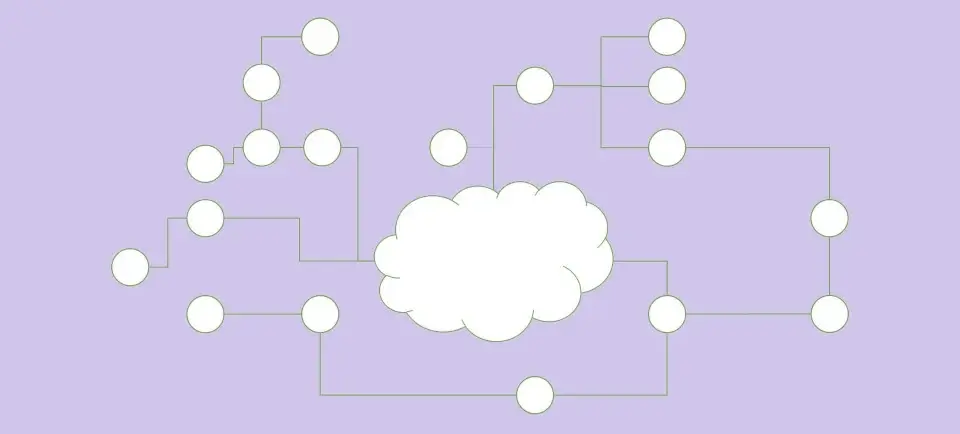Enterprise Resource Planning (ERP) systems are powerful software applications that are designed to help businesses manage various aspects of their operations. If you're considering implementing an ERP system, one of the first questions you're likely to ask is, "What are the ERP systems?" Understanding the different types of systems available can be critical to making an informed decision about which system will best suit your organization's needs.
In this text, we will explore the various types in detail, providing you with the information you need to make an informed choice. So, whether you're a small business owner or an executive at a large corporation, this guide is here to help you navigate the complex world of ERP systems and select the right solution for your business.
What Are ERP Systems and Why Should You Use One?
An ERP system is a software solution that integrates all of the major business processes within an organization. These processes may include finance, accounting, supply chain management, inventory management, human resources, customer relationship management, and more. By bringing these various processes together into a single system, ERP software types can help businesses streamline their operations, improve efficiency, and decrease costs.
Here are some of the key benefits of using an ERP system:
Centralized Data: An ERP system consolidates all of your business data into a single, centralized database, making it easy to access and manage. This means you can easily track inventory levels, customer orders, employee information, financial data, and more from one location.
Improved Decision-Making: With real-time access to key business data, an ERP system can help you make better, more informed decisions. You can quickly identify areas of the business that need attention and take action before problems become serious.
Increased Efficiency: By automating many routine tasks, such as data entry and report generation, an ERP system can help you reduce the time and resources required to manage your business processes.
Enhanced Collaboration: An ERP system provides a centralized platform for employees to share information and collaborate on projects. This can help improve communication and teamwork across departments and locations.
Better Customer Service: By providing a more complete view of each customer, an ERP system can help you provide more personalized and efficient customer service. This can lead to higher levels of customer satisfaction and loyalty.
As companies continue to recognize the benefits of implementing an ERP, they are exploring ways to further enhance their systems. Emerging technologies such as AI, blockchain, AR, and IoT are driving the latest ERP trends. Industry-leading ERP solutions are already integrating many of these technologies.
AI and machine learning can automate tasks such as account reconciliations and improve accuracy in forecasting. Blockchain can enhance transparency in the supply chain by providing a detailed audit trail of a product's journey. AR can be utilized in retail to allow customers to virtually place items in their homes before purchasing, and IoT devices can provide real-time data for the ERP to analyze and act upon.
Additionally, businesses are increasingly seeking to consolidate their applications onto a single platform. Gartner predicts that by 2026, 40% of services companies will have unified their core processes into a single suite. As ERP providers expand their offerings and more businesses recognize the value of a unified system, this trend is expected to continue to grow.
Types of ERP Systems
Having a solid grasp of the various types of systems is crucial when it comes to selecting the ideal solution for your business. Knowing the ins and outs of ERP types empowers you to assess and compare the features, capabilities, and drawbacks of each system, empowering you to make an educated decision that aligns with your company's objectives and needs. Failing to understand the different ERP options can lead to a suboptimal or unsuitable choice, potentially causing negative outcomes such as poor efficiency, reduced output, and missed business prospects.
Custom, Ready-Made, and Hybrid ERPs
When it comes to purchasing an ERP system, businesses have three broad options to choose from: fully customized software, ready-made software, and the hybrid model.
Fully customized software, also known as custom software, is an exclusive ERP system built from scratch by a development team based on the business's specific requirements. This option is ideal for companies that require complex systems and have a higher budget to match.
Pros:
Custom ERPs are designed and developed to meet the specific needs and requirements of a company, which can improve efficiency and productivity.
They provide complete control over the software, including the features, functionality, and data.
Custom ERPs can be designed to integrate with existing software and hardware systems, which can save time and money.
Cons:
Custom ERPs can be expensive, requiring significant investment in time and resources to develop.
They can be difficult to maintain and upgrade, as they are unique to a specific company.
They can be difficult to implement, as they require significant coordination between the development team and the company's internal teams.

Ready-made software, also known as off-the-shelf software, is a pre-built ERP software package that requires little customization and can be implemented quickly. This option is generally more suitable for small and medium-sized businesses that have basic ERP needs and a limited budget.
Pros:
Ready-made ERPs are generally more affordable than custom solutions.
They are quicker to implement and require less development time and resources.
Ready-made ERPs are typically designed to meet industry standards and best practices, which can improve efficiency and reduce risk.
Cons:
Ready-made ERPs may not meet all the specific needs and requirements of a company.
They can be more difficult to customize or integrate with existing software and hardware systems.
Ready-made ERPs may require ongoing licensing fees or subscription costs, which can add up over time.
The hybrid model is a combination of both fully customized and ready-made software. It's an option for companies that already have an existing ERP solution but wish to develop new modules. This option offers greater flexibility and allows businesses to expand their systems according to their needs.
Pros:
Hybrid ERPs offer greater flexibility than either custom or ready-made solutions, as they can be tailored to meet specific needs while also leveraging the benefits of off-the-shelf software.
They provide a high level of control and customization while also offering greater scalability and lower costs than custom solutions.
Hybrid ERP systems examples can be more easily integrated with existing software and hardware systems.
Cons:
Hybrid ERPs can be more complex and difficult to implement than either custom or ready-made solutions.
They require a greater level of expertise and technical knowledge to manage effectively.
Hybrid ERPs can be more expensive than ready-made solutions due to the additional development and customization required.
Cloud-Based and On-Premises ERPs

In terms of selecting between cloud-based and on-premises types of ERP systems, the primary contrast lies in their deployment. Cloud-based software, also referred to as Software-as-a-Service (SaaS), is hosted on the provider's servers and accessed through a web browser. On the other hand, on-premises software is installed locally on a company's computers and servers.
Apart from deployment, there is another key distinction between cloud and on-premises solutions, and that is how they are priced. Cloud software is typically priced on a monthly or annual subscription basis, with additional recurring charges for support, training, and updates. In contrast, on-premises software is generally priced on a one-time perpetual license fee, which is usually based on the size of the organization or the number of concurrent users.
Despite the higher upfront expense of on-premises systems, some businesses prefer them because of the complete ownership and control they provide. However, cloud-based ERP solutions have seen widespread adoption due to their low cost of entry and ease of access from any device with an internet connection.
Hybrid deployments, which combine cloud and on-premises software, have also become popular ERP systems due to their flexibility and scalability. Ultimately, the choice between cloud-based and on-premises ERP systems depends on the specific needs and budget of each business.
Do you find it challenging to decide between these species? We have listed the advantages and disadvantages for you to save time. You only need to identify your priorities and continue reading.
Cloud-based ERP Advantages:
Accessibility: Cloud-based ERPs can be accessed from anywhere with an internet connection, allowing for more flexible and remote work options.
Cost-effective: These systems often have lower upfront costs, as they do not require expensive hardware or maintenance.
Scalability: Cloud-based ERPs can be easily scaled up or down depending on the needs of the business.
Automatic updates: Cloud-based ERPs are often updated automatically by the service provider, ensuring that the system is always up-to-date with the latest features and security measures.
Cloud-based ERP Disadvantages:
Security concerns: Storing sensitive data on a cloud-based system can raise security concerns.
Reliance on Internet connection: Cloud-based ERPs require a stable and reliable Internet connection to function properly.
Limited control: With a cloud-based system, the business may have limited control over the system's functionality and customization options.
Potential downtime: If the cloud-based system experiences downtime or service disruptions, the business's operations may be affected.
On-premises ERP Advantages:
Control: On-premises ERPs give the business complete control over the system's functionality and customization options.
Security: Data is stored locally, reducing the risk of security breaches.
Reliability: On-premises systems do not rely on an internet connection and are less likely to experience downtime or service disruptions.
Integration: On-premises systems can be more easily integrated with other on-premises systems or software.
On-premises ERP Disadvantages:
High upfront costs: These systems require a significant upfront investment in hardware and maintenance.
Limited accessibility: On-premises systems are not easily accessible from remote locations or devices.
Scalability challenges: Scaling up or down may require significant changes to the system and may not be as flexible as cloud-based systems.
Manual updates: Updates and maintenance must be performed manually, which can be time-consuming and may require dedicated IT staff.
Hybrid ERP Advantages:
Flexibility: Hybrid ERPs offer a flexible approach that can be tailored to meet the business's specific needs.
Scalability: Hybrid systems allow for greater scalability than on-premises systems while still maintaining some level of control and security.
Customization: The business can choose which functions are managed on-premises and which are managed through the cloud, allowing for greater customization options.
Cost-effectiveness: Hybrid systems offer a more cost-effective solution than fully on-premises systems while still maintaining some level of control.
Hybrid ERP Disadvantages:
Complexity: Hybrid systems can be more complex to manage, requiring more expertise and potentially more dedicated IT staff.
Integration challenges: Integrating on-premises and cloud-based systems can be challenging and may require additional software or services.
Potential security concerns: Storing sensitive data on the cloud portion of a hybrid system can raise security concerns.
Reliance on Internet connection: The cloud portion of a hybrid system still requires a stable and reliable Internet connection to function properly.
Generic and Industry-specific Types of ERP
When it comes to choosing an ERP system, businesses have the option of selecting a generic ERP or an industry-specific ERP.
A generic ERP solution is designed to cater to all kinds of business niches and offers all the basic functionalities to automate a company's workflow effectively. This one-size-fits-all solution requires less implementation cost and time, making it easy to integrate and operate concurrently with your business management system.
However, it may offer limited flexibility and modification options, and to make it work for your business, you might need specialized customization, which can cost extra time and money.
On the other hand, industry-specific ERP systems are designed to meet the unique needs of a particular industry, and it incorporates all the critical metrics of your business process. Industry-specific ERP is optimized with functionality that solely focuses on a specific industry, making it an excellent fit for businesses looking for specific solutions. With an industry-specific ERP system, businesses can adjust the characteristics according to their needs without incurring further customization costs.
However, industry-specific ERP systems may be more expensive and complex to integrate compared to generic ERPs.
An example of ERP systems can support all the basic modules such as accounting, finance, CRM, HRM, supply chain management, job costing, inventory tracking, delivery management, and other specialized functions unique to the manufacturing industry.
According to an IFS study, 67% of ERP users want more industry-specific functionality, which is an indication that industry-specific ERPs are gaining popularity among businesses.
Not certain which type is suitable for your business? Follow this step-by-step checklist to help you decide:
Assess your business potential and the gaps that an ERP system could fill and improve.
Analyze and comprehend the features of various ERP systems. Then, determine which elements are necessary for your business.
Identify the areas of your business where you want to implement ERP first.
Evaluate the dependability of the system, as your business requirements will change over time. The ERP system you select should be able to support your business for an extended period.
Consider the cost of the system, which includes the initial implementation expense and future modifications. It should generate maximum revenue for your company.
Top ERP systems by company size
For small businesses, it's essential to find an ERP system that's affordable, easy to use, and provides basic features like accounting and inventory management. Some common ERP systems for small businesses include Zoho, QuickBooks, and Sage 50. These systems are known for their simplicity, user-friendliness, and affordability.
For midsize businesses, the needs are more complex. They require more advanced features, such as CRM, HRM, and supply chain management. ERP systems like Microsoft Dynamics 365, SAP Business One, and Netsuite offer robust functionalities and scalability, making them ideal for midsize companies. These systems are designed to manage the complexities of midsize businesses and offer real-time data and analytics for better decision-making.
For large enterprises, ERP systems need to be highly scalable, flexible, and customizable to meet their unique needs. Examples of ERP systems for enterprises include Oracle ERP Cloud, SAP S/4HANA, and Infor CloudSuite. These systems offer comprehensive functionalities for complex operations, advanced analytics, and AI-based features for predictive insights. They are designed to manage multiple locations, business units, and global operations, making them an excellent choice for large enterprises.
How to Choose the Right Erp Software?
Selecting the appropriate ERP software is a crucial decision that can significantly impact your business. With numerous options available in the market, it can be overwhelming to choose. Here are some steps to follow to ensure that you select the right ERP software for your business:
1. Prepare a plan
Before you start searching for an ERP system, it's vital to prepare a plan that outlines your business objectives and requirements. Consider factors such as the size of your business, industry, number of users, and specific business processes that need automation. This plan will help you identify the features and functionality that are essential for your business.
2. Research and consult
Next, research and explore ERP systems that are suitable for your business. Seek recommendations from industry associations, peers, and technology experts. Attend ERP seminars, webinars, and conferences to learn about the latest trends and solutions in the market. Consulting with an ERP specialist can also provide valuable insights into the right solution for your business.
3. Analyze ERP systems
Once you have a list of ERP systems, it's time to analyze them in detail. Look for vendors that have experience working with businesses similar to yours. Check the vendor's track record and reputation in the market, and verify customer testimonials and references. Evaluate the vendor's customer support, training, and implementation services.
Next, evaluate the ERP system's features and functionality against your business requirements. Look for systems that have a user-friendly interface, are easy to use, and can integrate with other software. Consider the system's scalability, security, and reporting capabilities. Ensure that the ERP system is compatible with your existing hardware and software infrastructure.
4. Make a decision
After analyzing and evaluating the ERP systems, it's time to make a decision. Choose a system from your TOP ERP systems list that meets your business requirements and objectives. The ERP system should be adaptable to the changing needs of your business, cost-effective, and provide a solid return on investment. Ensure that you understand the vendor's pricing and licensing structure and negotiate terms and conditions that are favorable for your business.
In conclusion, selecting the right ERP software requires careful consideration and analysis. By following these steps, you can ensure that you choose an ERP system that is tailored to your business needs, meets your objectives, and provides a positive impact on your business processes. Remember that investing in the right ERP software can result in significant cost savings, improved efficiency, and a competitive advantage for your business.





